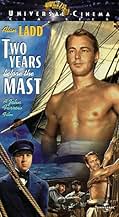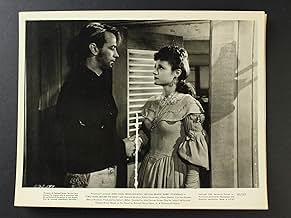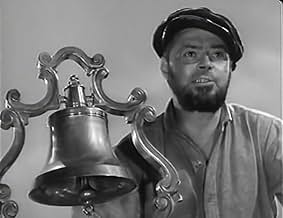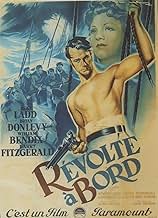VALUTAZIONE IMDb
6,9/10
590
LA TUA VALUTAZIONE
Aggiungi una trama nella tua linguaThe playboy son of a wealthy shipping magnate discovers at first hand the desperate privations suffered by the crew of one of his father's ships after he is unwillingly press-ganged aboard.The playboy son of a wealthy shipping magnate discovers at first hand the desperate privations suffered by the crew of one of his father's ships after he is unwillingly press-ganged aboard.The playboy son of a wealthy shipping magnate discovers at first hand the desperate privations suffered by the crew of one of his father's ships after he is unwillingly press-ganged aboard.
- Regia
- Sceneggiatura
- Star
- Premi
- 3 vittorie totali
Stanley Andrews
- Policeman
- (non citato nei titoli originali)
Byron Barr
- Friend
- (non citato nei titoli originali)
Ted Billings
- Crimp
- (non citato nei titoli originali)
Recensioni in evidenza
I am disappointed to see the sparsity of votes for this very-of-guys movie. This box-office smash of 1946 which is a sly attempt to invoke the more academy award favored Mutiny on the Bounty. Obviously, this movie was made to win awards and to give prestige to the studio, producer and actors involved. It did not garner a single nomination. Based on a true story and a best-selling non-fiction book from the 19th Century, it details the kind of cruelty and inhumanity that was used back then to run a ship. The stand-out of many fine performances is Howard da Silva as the captain Thompson who is more interested in breaking arrival records than in keeping the health, morality or moue of his crew in a flush of pink. Alan Ladd is the somewhat lead for make no mistake, this is no Ladd piece but an ensemble of Paramount's finest and great character actors. William Bendix, an actor who puts to shame the theory that real acting began with those "method" actors of the fifties with everything he does, is perfect as the first mate Amanzine. Shot strictly on studio sets, it does have the necessary realism of the open seas and azure skies that could give it the needed extra texture but it tries and works all the same. Unexpected events happen and formula is avoided until a rushed third act and ending that feels to hurried to resonate. That is why I voted it an 8/10. It is just too flat, as if the producers were late for dinner or something and slapped something together. Surely, events you want to see resolved is giving the sleight of hand and the picture is only 98 mins, so why the hurry? A good guy's movie with fine performances. It could have been a classic but it's just a good movie. P.S. I cannot believe Da Silva was not nominated for his performance. That is just a plain travesty.
It's been years since I read the book but as I remember it there was no Allan Ladd figure in it, a ne'er do well who is shanghaied aboard the cargo ship Pilgrim. There was just Richard Henry Dana who had dropped out of Harvard because of faulty vision and signed aboard because he thought it might help clear his sight. He didn't go back to college but he left an enduring and compelling account of his trip in the 1840s from Boston to the California coast, and his return aboard the Alert.
The record wasn't only accurate. It was colorful and even lyrical. Herman Melville acknowledged it as an inspiration for Moby Dick. It's an amazingly evocative narrative. Dana Point in southern California is named after him. He and his mates stood atop the cliffs and flung cow hides down to the sailors below, to be loaded aboard the ship.
California at the time was a province of Mexico, and places like San Francisco ("Yerba Buena") and Los Angeles were villages surrounded by large Spanish land grants and ranches. Dana was a humanitarian and, coming from New England, an anti-slavery activist. His purpose was to leave an accurate record of the life of sailors aboard American ships, documenting their characters and their mistreatment.
That's about what I remember from the book. The 1946 movie with Allan Ladd seems to owe a good deal to Jack London's "Sea Wolf", the story of a wealthy young shipwreck survivor picked up by a ship and coerced into working as a members of the crew by a captain who was a madman. This skipper, Howard Da Silva, isn't nuts but insists the men carry out his wishes as if they were the word of God. Maybe Captain Bligh was the inspiration here.
Life on the Pilgram is a rough life. Ladd is assigned the most menial of duties on the deck force while a very young stowaway is appointed cook's helper. In terms of working hours, cooks have one of the roughest jobs of all. They don't strain their muscles, as we had to on the deck force of a Coast Guard cutter, USCGC Gresham, but they have to get up before any of the rest of the crew and start preparing breakfast. And they don't stop working until they've finished cleaning up after the last meal of the day, hours after the day workers have stopped.
The deck force is no picnic either. Everyone on my ship knew the story (possibly "fake news") of the boatswain's mate on a neighboring ship who slapped a seaman across the face and gave him a bloody nose, then made him get on his knees and holystone the blood off the wooden deck. The Chief BM on the Gresham went no farther than raising fist over me and threatening to belt me. Oh, it was rough duty. The blond young Swedish maids helped ease the pain.
Where was I? Yes, no sea duty today compares to what these guys go through -- twenty lashes for looking cross-eye at an officer, and so forth. What's always puzzled me is, if they're going to administer lashes, why do they always rip the shirt down his back? Why not ask him to take it off? Brian Donlevy plays Richard Henry Dana, writing the book in his spare time.
The book, as I say, was a literary gem. Dana captured the experience of working on a sailing ship, including the floggings and the scurvy. (Viz: "Limeys.") Beyond that he gave us treats on landfalls, storms, and ice bergs. Da Silva is the uncompromising and humorless captain. William Bendix is the brutal First Mate Amazeen who gets to belt Ladd on the face. If the producers needed someone to beat hell out of Ladd, more than once it was Bendix. The two men were friends, despite a temporary falling out over Ladd's lack of interest in enlisting during the war.
In Pernambuco, the Pilgrim acquires a passenger -- a beautiful young woman, what else? Compare this to The Sea Wolf, which also picks up a pretty young girl and Jack London's prose turns to mush. Actually, here, Esther Fernández as the requisite romantic role, is quite attractive and gives a respectable performance. Her career flourished in her native Mexico.
I don't think I'll give away the ending except to say there is a violent clash, some deaths, and a victory of sorts. You'll probably enjoy the move. It's aglow with resentment and tension.
The record wasn't only accurate. It was colorful and even lyrical. Herman Melville acknowledged it as an inspiration for Moby Dick. It's an amazingly evocative narrative. Dana Point in southern California is named after him. He and his mates stood atop the cliffs and flung cow hides down to the sailors below, to be loaded aboard the ship.
California at the time was a province of Mexico, and places like San Francisco ("Yerba Buena") and Los Angeles were villages surrounded by large Spanish land grants and ranches. Dana was a humanitarian and, coming from New England, an anti-slavery activist. His purpose was to leave an accurate record of the life of sailors aboard American ships, documenting their characters and their mistreatment.
That's about what I remember from the book. The 1946 movie with Allan Ladd seems to owe a good deal to Jack London's "Sea Wolf", the story of a wealthy young shipwreck survivor picked up by a ship and coerced into working as a members of the crew by a captain who was a madman. This skipper, Howard Da Silva, isn't nuts but insists the men carry out his wishes as if they were the word of God. Maybe Captain Bligh was the inspiration here.
Life on the Pilgram is a rough life. Ladd is assigned the most menial of duties on the deck force while a very young stowaway is appointed cook's helper. In terms of working hours, cooks have one of the roughest jobs of all. They don't strain their muscles, as we had to on the deck force of a Coast Guard cutter, USCGC Gresham, but they have to get up before any of the rest of the crew and start preparing breakfast. And they don't stop working until they've finished cleaning up after the last meal of the day, hours after the day workers have stopped.
The deck force is no picnic either. Everyone on my ship knew the story (possibly "fake news") of the boatswain's mate on a neighboring ship who slapped a seaman across the face and gave him a bloody nose, then made him get on his knees and holystone the blood off the wooden deck. The Chief BM on the Gresham went no farther than raising fist over me and threatening to belt me. Oh, it was rough duty. The blond young Swedish maids helped ease the pain.
Where was I? Yes, no sea duty today compares to what these guys go through -- twenty lashes for looking cross-eye at an officer, and so forth. What's always puzzled me is, if they're going to administer lashes, why do they always rip the shirt down his back? Why not ask him to take it off? Brian Donlevy plays Richard Henry Dana, writing the book in his spare time.
The book, as I say, was a literary gem. Dana captured the experience of working on a sailing ship, including the floggings and the scurvy. (Viz: "Limeys.") Beyond that he gave us treats on landfalls, storms, and ice bergs. Da Silva is the uncompromising and humorless captain. William Bendix is the brutal First Mate Amazeen who gets to belt Ladd on the face. If the producers needed someone to beat hell out of Ladd, more than once it was Bendix. The two men were friends, despite a temporary falling out over Ladd's lack of interest in enlisting during the war.
In Pernambuco, the Pilgrim acquires a passenger -- a beautiful young woman, what else? Compare this to The Sea Wolf, which also picks up a pretty young girl and Jack London's prose turns to mush. Actually, here, Esther Fernández as the requisite romantic role, is quite attractive and gives a respectable performance. Her career flourished in her native Mexico.
I don't think I'll give away the ending except to say there is a violent clash, some deaths, and a victory of sorts. You'll probably enjoy the move. It's aglow with resentment and tension.
Ah, another "I wasn't in Mutiny on the Bounty" movie: Two Years Before the Mast. As countless tough guy actors got their chance to play a Captain Bligh ripoff, tons of leading man actors got their chance to play a Fletcher Christian ripoff. If you want to see a perpetually shirtless Alan Ladd in the Fletcher Christian part, and Howard Da Silva in the Captain Bligh part, rent this one.
Alan is young and inexperienced, and while in a tavern, he gets knocked over the head and kidnapped to work as a crewmember on an imposing ship. Back in the 1800s, things like that did happen, and it was pretty scary. Especially since the reason the sailors needed to kidnap their crew was because their captain was so tyrannical, no one in his right mind would volunteer.
As evil as Howard Da Silva is, Alan does have one friend aboard the ship: Brian Donlevy. Ironically, if you want to see Brian as a tough captain, check out the following year's The Song of Scheherazade. Brian is sympathetic and keeps a diary of all the atrocities committed aboard the ship. William Bendix is the first mate, torn between his loyalty to his captain and the horrors he sees. Roman Bohnen, Barry Fitzgerald, Ray Collins, and Darryl Hickman can also be seen in the supporting cast. Although you can tell the quality isn't A-tier, this one is still entertaining, so you can check it out if you're an Alan Ladd fan.
Alan is young and inexperienced, and while in a tavern, he gets knocked over the head and kidnapped to work as a crewmember on an imposing ship. Back in the 1800s, things like that did happen, and it was pretty scary. Especially since the reason the sailors needed to kidnap their crew was because their captain was so tyrannical, no one in his right mind would volunteer.
As evil as Howard Da Silva is, Alan does have one friend aboard the ship: Brian Donlevy. Ironically, if you want to see Brian as a tough captain, check out the following year's The Song of Scheherazade. Brian is sympathetic and keeps a diary of all the atrocities committed aboard the ship. William Bendix is the first mate, torn between his loyalty to his captain and the horrors he sees. Roman Bohnen, Barry Fitzgerald, Ray Collins, and Darryl Hickman can also be seen in the supporting cast. Although you can tell the quality isn't A-tier, this one is still entertaining, so you can check it out if you're an Alan Ladd fan.
The press gang of the "Pilgrim" recruits a crew and the ship sets sail. Captain Thompson (Howard Da Silva) is only concerned with breaking speed records and has First Mate Amazeen (William Bendix) and Second Mate Foster (Luis Van Rooten) as his side-kicks to run discipline with a rod of iron. There are floggings, rations, neglect and heartless sea burials on his journey. The crew who suffer include Charles Stewart (Alan Ladd), Henry Dana (Brian Donlevy) and Brown (Albert Dekker). Dana keeps an incident log which will change merchant sea law forever. It becomes published and is called "Two Years Before The Mast"
This is a true-life account of conditions at the time and is based upon a book that introduced maritime law. The cast are all good - Howard Da Silva makes an excellent bad guy. I don't usually like children in films but the stowaway Sam Hooper (Daryl Hickman) isn't as annoying as I feared he might be, and his inclusion in the story has relevance in how the crew relate to Charles. Indeed, he also brings out a human side to Mr Amazeen. However, I am not sure what the point of having the 2 passengers was - the film dragged whenever Maria (Esther Fernandez) was on screen. It was good to watch Charles's transformation from a dislikeable oik to a man with a conscience. There were also some humorous moments thrown in, eg, when Charles goes back to eat the chicken he has stolen in front of the crew that hate him. It's a good film but I never understand the point in scrubbing the decks. What's that about?
This is a true-life account of conditions at the time and is based upon a book that introduced maritime law. The cast are all good - Howard Da Silva makes an excellent bad guy. I don't usually like children in films but the stowaway Sam Hooper (Daryl Hickman) isn't as annoying as I feared he might be, and his inclusion in the story has relevance in how the crew relate to Charles. Indeed, he also brings out a human side to Mr Amazeen. However, I am not sure what the point of having the 2 passengers was - the film dragged whenever Maria (Esther Fernandez) was on screen. It was good to watch Charles's transformation from a dislikeable oik to a man with a conscience. There were also some humorous moments thrown in, eg, when Charles goes back to eat the chicken he has stolen in front of the crew that hate him. It's a good film but I never understand the point in scrubbing the decks. What's that about?
In the 1830's, the foppish son of a ship owner is shanghaied aboard his father's ship where he experiences the harsh realities of a brutal captain.
Leonard Maltin gives the movie a 1 & ½ out of 4. Shame on him. Sure, the film is no Mutiny on the Bounty (1935), and the script could be sharper. But, it's still a riveting shipboard drama, thanks to a fine cast, a good story, and a strong moral lesson. In the movie's pivotal role, Ladd transitions from a spoiled fop to a man among men in convincing fashion. The actor was never one to emote; at the same time, his low-key manner blends in well with the macho crew. And a heckuva crew it is—such forceful types as Dekker, Bendix, Donlevy, and, of course, a fearsome Howard DaSilva as the brutal captain. Mix and stir and you've got the ingredients of a highly combustible drama.
Of course, old Hollywood always created its own version of history. It's no secret the studios habitually bent fact in return for commercial appeal. So its not surprising that Paramount took liberties with the Dana book. For example, the script works a woman (Fernandez) onto the ship, which is not in the book. I expect they did that to burnish Ladd's appeal as a leading man and to widen audience appeal to include women-- never mind the facts of the book. As some anonymous wag put it-- never let the facts stand in the way of a good story.
Fortunately, it is a good story, even if the ship never leaves the sound stage. However, I wish director Farrow had made better use of close-ups to underscore dramatic high points. He's too impassive in what amounts to a very involving story. That aside, the movie certainly rates far better than a 1 & ½.
Leonard Maltin gives the movie a 1 & ½ out of 4. Shame on him. Sure, the film is no Mutiny on the Bounty (1935), and the script could be sharper. But, it's still a riveting shipboard drama, thanks to a fine cast, a good story, and a strong moral lesson. In the movie's pivotal role, Ladd transitions from a spoiled fop to a man among men in convincing fashion. The actor was never one to emote; at the same time, his low-key manner blends in well with the macho crew. And a heckuva crew it is—such forceful types as Dekker, Bendix, Donlevy, and, of course, a fearsome Howard DaSilva as the brutal captain. Mix and stir and you've got the ingredients of a highly combustible drama.
Of course, old Hollywood always created its own version of history. It's no secret the studios habitually bent fact in return for commercial appeal. So its not surprising that Paramount took liberties with the Dana book. For example, the script works a woman (Fernandez) onto the ship, which is not in the book. I expect they did that to burnish Ladd's appeal as a leading man and to widen audience appeal to include women-- never mind the facts of the book. As some anonymous wag put it-- never let the facts stand in the way of a good story.
Fortunately, it is a good story, even if the ship never leaves the sound stage. However, I wish director Farrow had made better use of close-ups to underscore dramatic high points. He's too impassive in what amounts to a very involving story. That aside, the movie certainly rates far better than a 1 & ½.
Lo sapevi?
- QuizAccording to Howard Da Silva in Alan Ladd's biography, Ladd and William Bendix did not talk to each other although they were friends. Between the scenes everyone went their separate ways.
- Citazioni
Captain Francis A. Thompson: Mr. Foster, remove his shirt.
2nd Mate Foster: Aye, aye, sir.
Charles Stewart: Never mind. I'll take it off.
- ConnessioniReferenced in Le avventure di re Leonardo: Anchors Awry or Nautical Nut (1961)
- Colonne sonoreTake Back the Heart
Written by Claribel (Charlotte Arlington Barnard) and Mrs. G.R. Gifford
I più visti
Accedi per valutare e creare un elenco di titoli salvati per ottenere consigli personalizzati
- How long is Two Years Before the Mast?Powered by Alexa
Dettagli
- Data di uscita
- Paese di origine
- Lingue
- Celebre anche come
- Two Years Before the Mast
- Luoghi delle riprese
- Azienda produttrice
- Vedi altri crediti dell’azienda su IMDbPro
Botteghino
- Budget
- 2.000.000 USD (previsto)
- Tempo di esecuzione
- 1h 38min(98 min)
- Colore
- Proporzioni
- 1.37 : 1
Contribuisci a questa pagina
Suggerisci una modifica o aggiungi i contenuti mancanti

























